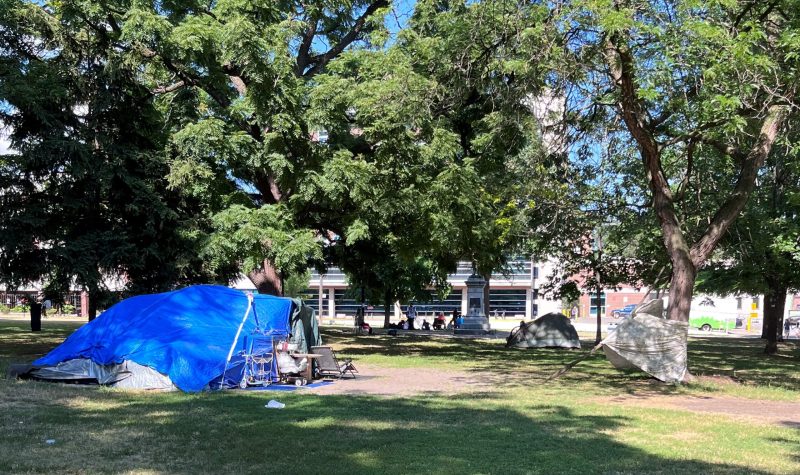Toronto’s Ombudsman finds that the city is relying on outdated protocols and tactics to respond to and handle the increasing tent encampments in parks and public spaces.
Ombudsman Kwame Addo released an interim report that analyzed the clearing of three large tent encampments in the summer of 2021 by Toronto police.
According to the report, the protocols to respond to persons living in encampments has not been updated since 2005.
Approaches to the clearing caused extensive disruption and trauma for the people involved, the report reads.
The clearing of the camps were met with criticism and scrutiny from politicians, advocacy groups and the general public - images and videos of violent clashes between police, protesters and the unhoused were circulated online.
Once encampments were fully disassembled, the city installed fences around the areas to prevent individuals from returning and setting up their tents again.
The three main encampments areas in the downtown core were in Trinity Bellwoods park, Alexandra park and outside Lamport Stadium.
When the public outcry against the clearing of the camps persisted, which included 50 complaints, the city launched an investigation in September 2021.
Initial findings include "the erosion of trust with the municipal government and disruption with community organizers."
Other findings in the report include an assessment of the Encampment office, which is responsible for dealing with encampments and the unhoused.
Addo writes that the office is understaffed and did not have the necessary resources to adequately deal with the three camps last summer.
Further, the city’s approach to responding to these camps has been mandated under the Interdepartmental Service Protocol for Homeless People Camping in Public Spaces. It has not been updated since 2005 as well, and Addo writes that it has not been followed consistently by the city staff.
One of the more notable parts in the report is how city staff and police are expected to respond to and deal with unhoused, vulnerable individuals without increasing the potential for trauma and violence. Co-operation and learning new, safer approaches are what Addo said the city wants to achieve.
The report outlines several recommendations that were all accepted by Toronto Mayor John Tory and the city, according to a recent press release.
Recommendations for future action include updating the protocol, adequately staffing the Encampment office, holding consultations with the surrounding communities and people with lived experiences and regaining public confidence in the municipal government and city staff.
In total, there are eight recommendations in the report.
This interim report is part of a larger initiative by the city to help its approach towards dealing with the encampments. A more comprehensive report is expected to be released, but no specific date was mentioned in the report.
Since 2020, there have been bylaws established to prevent individuals from setting up tents in parks before police were summoned to these areas to clear all tents.
Following the clearing of the encampments, Tory spoke to the media in September 2021 defending the Toronto police and city staff. He said the clearing was meant to help maintain the safety of the public in these parks.
Recently, the city has gradually closed its emergency shelters as COVID restrictions loosen. Advocacy groups, including the Shelter and Housing Justice Network, say this will push more of the unhoused into public parks because they have no alternative.
CJRU contacted Ombudsman Kwame Addo and Toronto’s Encampment and Outreach office for comment about the report and what are first steps for the recommendations.
More details to come.
Listen to CJRU's news update:


